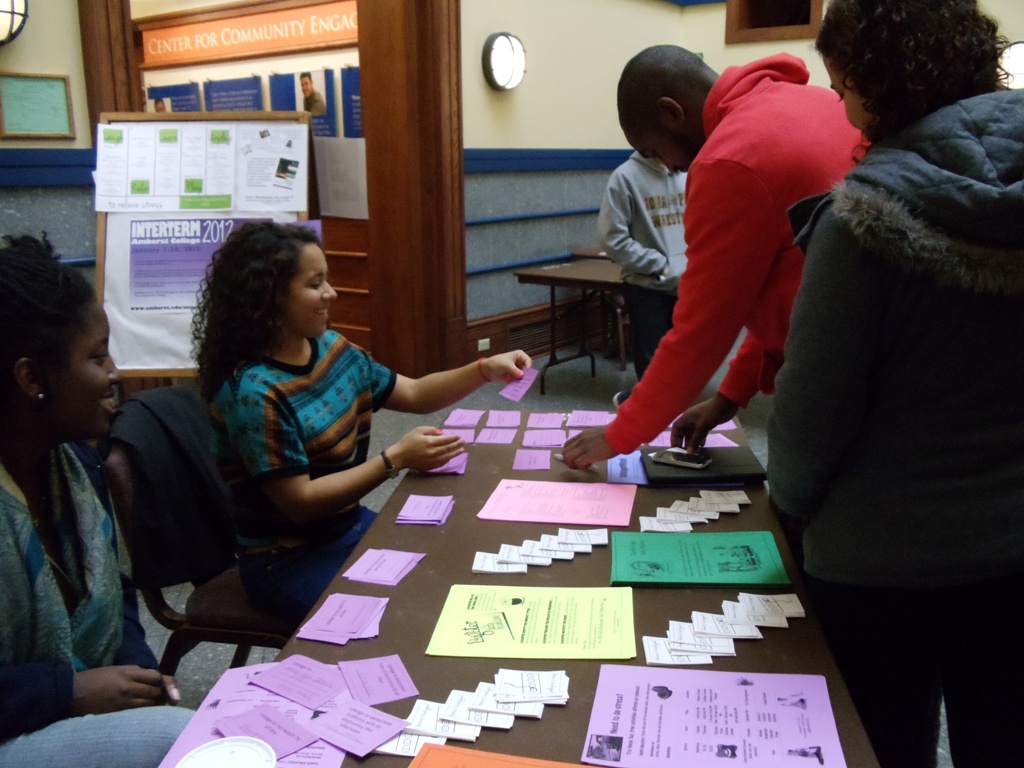

Amidst a high-energy week of essays and midterms and countless other deadlines, Amherst Unplugged invited students to take a step back, unplug and power down on some of that stress.
Amherst Unplugged started up last year, when a group of students and staff explored the role of technology in modern day life. They found that, while technology is an important part of everyone’s daily existence, it has also been shown to potentially increase stress, depression and a sense of isolation.
“There are lots of students constantly walking around with iPods, computers and cell phones. We have become technology dependent,” said Jullian Stockmo ’13, a member of the Student Health Educators (SHEs).
Unplugging allows students to separate themselves from the technology that surrounds them and interact more directly with their surrounding world.
“This is a small push to get people to communicate on a face to face level. Without electronics like cell phones it gives people a reason to seek other people out,” said Shanika Audige ’12, another SHE who helped run the event.
Though modeled after similar programs at different institutions, Amherst Unplugged is unique in that it is run on only one day and that it is connected to several groups and clubs on campus. Stress Relief Week and Amherst Unplugged were planned by a large task force, which included several Deans, representatives of the Student Health Educators and representatives from Random Acts of Kindness. Other groups also participated, including Gad’s House of Improv which advocated “Laughter as the Best Medicine.”
“What is interesting about our program compared to others is that other programs are all or nothing in that students have to completely unplug to take part. We offer students the opportunity to do what they can so that students feel more comfortable unplugging, ” Audige said.
Amherst Unplugged’s decision to coincide with Stress Relief Week helped drive home the importance of knowing how to relieve stress.
“We always try to do Amherst Unplugged in conjunction with a de-stress week to remind students that technology can be an added stressor, and to remind them to take time for activities like exercise or hanging out with friends that help reduce stress more than being on a computer,” said Conny Morrison ’12, a SHE who helped put the programs together. “This de-stress week was planned to coincide with mid-terms/the pre-Thanksgiving rush of work that students often get.”
This is the second year Amherst Unplugged took place on campus, and it was moved to fall, a change that many see as beneficial to the program.
“Last year we ran Unplugged in the spring, but spring is jam-packed with activities. Now that it is in November, it is midterm time and everyone is stressed out. Across the board of class years, people are feeling stressed out. Freshmen are feeling homesick, seniors are feeling thesis stress, juniors are feeling stress of going abroad. It’s really good timing [for Amherst Unplugged],” said Stockmo.
Last year there were over a hundred participants in Amherst Unplugged. Though this year’s participation saw a slight decrease, hovering around 80 participants, both the program and Stress Relief Week were declared a success.
“Stress Relief Week and Amherst Unplugged both went really well,” said Morrison. “Spa night on Tuesday was hugely successful, and the SHEs spoke to a lot of students about technology dependence and pledging to reduce use. Random Acts of Kindness also held a well attended tea service.”
Amherst Unplugged and Stress Relief Week are initiatives to help students deal with a problem that they too often overlook.
“It is about getting students to think about things that cause them stress. Stress is so much a part of our lives that sometimes we forget about its root causes. It is important to notice what causes stress and take care of those factors and relax,” Audige said.
There are many things that students can do to relieve stress, and each individual needs to find what works for them.
“Stress is very personal. Whether its video games, reading, doing yoga, running, walking, whatever works for you to de-stress, you need to find something that helps you de-stress and do it,” Stockmo said. “One of the best things for me to de-stress is taking an hour for me time”
Organizers of the event hope to increase participation in the future and continue to spread information on how students can learn to relieve stress.
“We hope that students will take on increased leadership for this event so that it can become a greater movement with even more participation,” Morrison said.